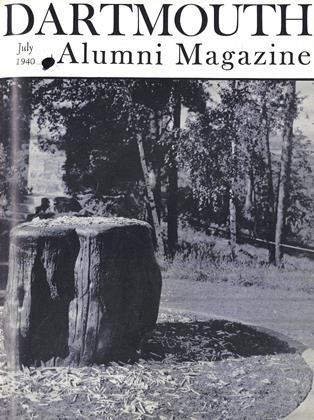It has been a dramatic year. The seasons have moved in the way of Northern New England that soon initiates the freshman from more even climes to the ancient hill-country principle: "you have to take the bitter to enjoy the sweet." Crisp autumn, with stabs of flaming color on Balch Hill, marches relentlessly into bleak November and just as surely into zero December Great piles of snow, heaped and blown in blizzards.... then the first faint false spring and bitter realization of how far away spring really is. It finally comes with a rush, sweet spring, songs and green grass and foliage and more songs on the campus.
The last few days of Commencement are the finest, the sunniest, the happiest, the saddest too. In this New Hampshire year the seasons have moved as ever. They have, as eternally, given us the bitter to enjoy the sweet. But the Dartmouth year, the American year, this year of man everywhere, is bitter. The marching, the cries of shattering pain, the anguish of honest men tormented by doubt and despair, have moved cruelly, relentlessly on.
The gaiety of reunion classes and the satisfaction and pride of seniors and their families were on the surface of Commencement. Catastrophe in the world surged above the surface and broke in a shower of significant words and sharp phrases in many of the speeches of the weekend. Harsh reality arrived to preside at the closing of an institution older than the nation itself.
PRESIDENT HOPKINS sharply censured minority groups within the colleges which he said, in his Baccalaureate Address, "have given the impression of the undergraduate as one unwilling to stand upon his feet or to listen to any advice except the echo of his own desires." The conflict in Europe was placed squarely before 470 graduating seniors and a host of parents and friends and alumni visitors when the President said if the allies are defeated "our race" will have only temporary immunity. He advocated preparedness and took issue with spokesmen of student bodies who have sent petitions to Washington "protesting that they see nothing of a struggle against the forces of evil." But he blamed the college in large measure for having found no way to compensate for the lack of realistic controls which formerly tempered student thinking.
The editors of The Dartmouth have in a series of editorials before and during Commencement campaigned for continuance of America's policy of staying away from the war, opposing "specifically the extension of any aid, beyond the provisions of present cash and carry legislation, to the Allied powers." Because we respect the sincerity of the editors' opinions, and because we know that Dartmouth men want to learn on what foundations these are based, we are reprinting in this issue the student paper's editorial published on Baccalaureate Sunday.
IN A POWERFUL, thoughtful talk at the Alumni Luncheon Boynton Merrill '15 asked the College to "stick to its last" and hold to its highest principles of freedom of thought, continuing to foster this basic purpose of the liberal arts college. Dartmouth must continue, he said, to provide the country and the world with educated men for citizenship and leadership, no matter how deafening the holocaust about it may become. His was a strong voice raised for theories that must be stated and constantly kept in mind.
IN HIS OPENING ADDRESS last fall President Hopkins said "this too will pass." This was his hope as it was the expectation of others. We were prepared for a little bitter, just a dash of sourness and disillusion, then free to enjoy the sweet—to have and hold again social and economic security and casually accepted freedom. The Baccalaureate Address needed to be made to the seniors, to the others who heard his voice, and to those who are reading his words in these pages this month.
In prophetic fashion he has spoken to the Class of '40. The seniors were on their mark, ready to go. The very haste of throwing last belongings in the family car to dash to "the wide, wide world" was the eager desire of these nearly 500 men to start their work and take places in life. But the bitter in the world today overpowers and crushes the sweet. It will not pass soon. This will be a long March mud season of lowering clouds, storms, despairing hopes. Spring will be very late coming. They needed to know before they left.
 View Full Issue
View Full Issue
More From This Issue
-
 Article
ArticleCommencement Climax of 171st Year
July 1940 -
 Class Notes
Class NotesThirtymen Celebrate With Record 265 Reuners
July 1940 By BUD FRENCH '30 -
 Class Notes
Class NotesThirtieth Reunion of 1910
July 1940 By H. P. HINMAN -
 Class Notes
Class NotesGreat Twenty-Fifth for 1915
July 1940 By DONALD C. BENNINK -
 Article
ArticleBaccalaureate, 1940: The Upright Man
July 1940 -
 Article
ArticleDartmouth Remembers' Craven
July 1940
The Editor
-
 Article
ArticleOuting Club Progress
November 1935 By The Editor -
 Article
ArticleThe Month
January 1936 By The Editor -
 Article
ArticleMore Fun at Home
February 1940 By The Editor -
 Article
ArticleFootball
November 1940 By The Editor -
 Article
ArticleWah-Hoo-Wah!
October 1941 By The Editor -
 Article
ArticleThe Associated Schools
April 1942 By The Editor







